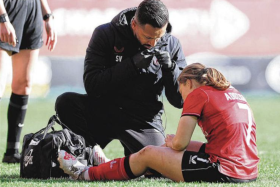Quicker recovery, less pain from hip surgery
New SGH programme also provides patients with a pre-surgery Joint Replacement Class
A new programme launched this month by Singapore General Hospital (SGH) will help patients who undergo hip replacement surgery shorten their stay in hospital, thus making it easier on their wallets.
The launch of the enhanced recovery programme comes after a successful pilot that began last January.
Mr Lionel Liew Kong Chung, 64, was one of 30 patients selected for the programme. He had felt pain in his right hip and was referred to SGH's department of orthopaedic surgery.
"I underwent an X-ray and found the cartilage in my hip was worn out," said the retired lawyer, who was diagnosed with severe osteoarthritis in the hip.
He tried taking supplements, but the pain did not go away. When it got so bad that he could not even bend to put on his socks, he was advised to go for a total hip replacement.
Mr Liew, who underwent surgery last September, was one of 80 per cent of patients in the pilot who were able to go home within 23 hours of the surgery, compared with the typical four to five days in hospital.
The 30 patients selected for the pilot programme were generally fit, able to perform normal daily activities and had good family support.
Together with their family members or caregivers, they attended a newly introduced Joint Replacement Class where they were given pre-surgery instructions and taught pain management and wound care, diet and nutrition, and rehabilitation exercises.
Dr Pang Hee Nee, consultant at SGH's department of orthopaedic surgery, said: "As soon as the anaesthesia wears off, patients are encouraged to get off the bed to walk. Doing so lowers their risk of possible post-surgery complications such as blood clots, and patients can go home earlier with a smaller bill."
A four-day stay in a Class B2 ward, for instance, costs $11,700, compared with $9,400 a day before MediShield Life claims.
After the surgery, patients rest in a short-stay ward and, if they do not feel nauseous and can walk after the operation, may be discharged.
In the pilot, before a follow-up review with the surgeon, SGH physiotherapists and community nurses made home visits during the first two weeks to assess the patients' recovery and aid them in walking and doing leg exercises.
The new programme is made possible by the adoption of a minimally invasive surgical technique which pulls apart the thigh muscles to get to the damaged hip joint, unlike the standard muscle-cutting technique.
An average of 300 patients undergo total hip replacement at SGH each year.
Get The New Paper on your phone with the free TNP app. Download from the Apple App Store or Google Play Store now


